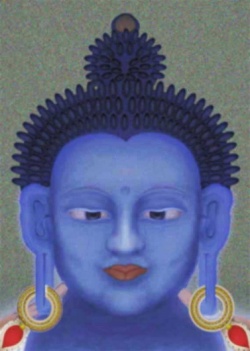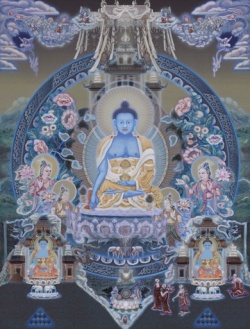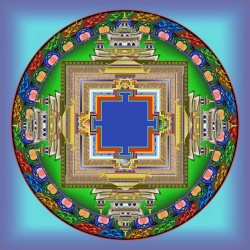Difference between revisions of "Yongé Mingyur Dorje"
m (1 revision: Adminos 10 october) |
|||
| Line 1: | Line 1: | ||
| + | [[File:Akshobya-detail-face-.jpg|thumb|250px|]] | ||
'''[[Yongé Mingyur Dorje]]''' (Tib. {{BigTibetan|[[ཡོངས་དགེ་མི་འགྱུར་རྡོ་རྗེ་]]}}, Wyl. ''[[yongs dge mi 'gyur rdo rje]]'') (1628/41-1708), aka '''[[Rigdzin Mingyur Dorje Drakpo Nuden Tsal]]''' — a [[Nyingma]] [[tertön]] (one of the twenty-one major [[tertöns]] with the [[name]] Nuden) and [[Karma Kagyü]] [[master]] who was a close student of [[Karma Chakmé]], the [[Tenth Karmapa]] [[Chöying Dorje]], and Surmang Trungpa Kunga Namgyal (Wyl. ''zur mang drung pa kun dga' rnam rgyal''), the Fourth [[Surmang Trungpa Incarnation Line|Surmang Trungpa]]. His most illustrious students included the [[Eleventh Karmapa]], [[Yeshe Dorje]], the Eighth [[Tai Situ]], [[Situ Panchen Chökyi Jungné|Kunkhyen Chökyi Jungné]], and [[Tertön]] Könchok Dorje. | '''[[Yongé Mingyur Dorje]]''' (Tib. {{BigTibetan|[[ཡོངས་དགེ་མི་འགྱུར་རྡོ་རྗེ་]]}}, Wyl. ''[[yongs dge mi 'gyur rdo rje]]'') (1628/41-1708), aka '''[[Rigdzin Mingyur Dorje Drakpo Nuden Tsal]]''' — a [[Nyingma]] [[tertön]] (one of the twenty-one major [[tertöns]] with the [[name]] Nuden) and [[Karma Kagyü]] [[master]] who was a close student of [[Karma Chakmé]], the [[Tenth Karmapa]] [[Chöying Dorje]], and Surmang Trungpa Kunga Namgyal (Wyl. ''zur mang drung pa kun dga' rnam rgyal''), the Fourth [[Surmang Trungpa Incarnation Line|Surmang Trungpa]]. His most illustrious students included the [[Eleventh Karmapa]], [[Yeshe Dorje]], the Eighth [[Tai Situ]], [[Situ Panchen Chökyi Jungné|Kunkhyen Chökyi Jungné]], and [[Tertön]] Könchok Dorje. | ||
| − | + | [[File:Akshobya-klass.jpg|thumb|250px|]] | |
The first [[Yongé Mingyur Dorje]] is also the founder of the [[Pal Tergar Rigzin Khacho Dargye Ling Monastery]], which was established as a center for the teachings that he revealed. In the centuries that followed, this [[monastery]] retained its affiliation with the [[Karma Kagyü]] School, yet also kept up its own unique practices and [[rituals]]. After the {{Wiki|Cultural Revolution}}, it was rebuilt both in [[Tibet]] and in [[Bodhgaya]], [[India]] by the current [[Mingyur Rinpoche|Yongey Mingyur Rinpoche]]. | The first [[Yongé Mingyur Dorje]] is also the founder of the [[Pal Tergar Rigzin Khacho Dargye Ling Monastery]], which was established as a center for the teachings that he revealed. In the centuries that followed, this [[monastery]] retained its affiliation with the [[Karma Kagyü]] School, yet also kept up its own unique practices and [[rituals]]. After the {{Wiki|Cultural Revolution}}, it was rebuilt both in [[Tibet]] and in [[Bodhgaya]], [[India]] by the current [[Mingyur Rinpoche|Yongey Mingyur Rinpoche]]. | ||
| − | + | [[File:Alus-baas.jpg|thumb|250px|]] | |
[[Tsoknyi Rinpoche]] writes: | [[Tsoknyi Rinpoche]] writes: | ||
:Born in the Lhatok region of [[Kham]], in his early years [[Yongé Mingyur Dorje]] had visions of [[Padmasambhava]], [[Karma Pakshi]], [[Hayagriva]], [[Vajravarahi]], and [[Mahakala]]. He composed a [[guru]] [[sadhana]] for [[Karma Pakshi]] [which is one of the most widely practised [[sadhanas]] in the [[Karma Kagyu]] [[lineage]],] as a ’[[mind terma|mind treasure]]’ that he received in a [[pure vision]]. The [[Tenth Karmapa]], [[Chöying Dorje]] (1604-1674), gave him the [[name]] Rigdzin [[Mingyur Dorje]] Drakpo Nuden [[Tsal]]. [[Yongé Mingyur Dorje]] also became a learned and highly accomplished [[master]] through studying the [[sutra]]s, [[tantra]]s, and general {{Wiki|sciences}}. | :Born in the Lhatok region of [[Kham]], in his early years [[Yongé Mingyur Dorje]] had visions of [[Padmasambhava]], [[Karma Pakshi]], [[Hayagriva]], [[Vajravarahi]], and [[Mahakala]]. He composed a [[guru]] [[sadhana]] for [[Karma Pakshi]] [which is one of the most widely practised [[sadhanas]] in the [[Karma Kagyu]] [[lineage]],] as a ’[[mind terma|mind treasure]]’ that he received in a [[pure vision]]. The [[Tenth Karmapa]], [[Chöying Dorje]] (1604-1674), gave him the [[name]] Rigdzin [[Mingyur Dorje]] Drakpo Nuden [[Tsal]]. [[Yongé Mingyur Dorje]] also became a learned and highly accomplished [[master]] through studying the [[sutra]]s, [[tantra]]s, and general {{Wiki|sciences}}. | ||
Latest revision as of 11:10, 12 October 2013
Yongé Mingyur Dorje (Tib. ཡོངས་དགེ་མི་འགྱུར་རྡོ་རྗེ་, Wyl. yongs dge mi 'gyur rdo rje) (1628/41-1708), aka Rigdzin Mingyur Dorje Drakpo Nuden Tsal — a Nyingma tertön (one of the twenty-one major tertöns with the name Nuden) and Karma Kagyü master who was a close student of Karma Chakmé, the Tenth Karmapa Chöying Dorje, and Surmang Trungpa Kunga Namgyal (Wyl. zur mang drung pa kun dga' rnam rgyal), the Fourth Surmang Trungpa. His most illustrious students included the Eleventh Karmapa, Yeshe Dorje, the Eighth Tai Situ, Kunkhyen Chökyi Jungné, and Tertön Könchok Dorje.
The first Yongé Mingyur Dorje is also the founder of the Pal Tergar Rigzin Khacho Dargye Ling Monastery, which was established as a center for the teachings that he revealed. In the centuries that followed, this monastery retained its affiliation with the Karma Kagyü School, yet also kept up its own unique practices and rituals. After the Cultural Revolution, it was rebuilt both in Tibet and in Bodhgaya, India by the current Yongey Mingyur Rinpoche.
Tsoknyi Rinpoche writes:
- Born in the Lhatok region of Kham, in his early years Yongé Mingyur Dorje had visions of Padmasambhava, Karma Pakshi, Hayagriva, Vajravarahi, and Mahakala. He composed a guru sadhana for Karma Pakshi [which is one of the most widely practised sadhanas in the Karma Kagyu lineage,] as a ’mind treasure’ that he received in a pure vision. The Tenth Karmapa, Chöying Dorje (1604-1674), gave him the name Rigdzin Mingyur Dorje Drakpo Nuden Tsal. Yongé Mingyur Dorje also became a learned and highly accomplished master through studying the sutras, tantras, and general sciences.
- On one occasion, the Kagyü lineage was threatened by an imminent invasion of Tibet, as well as by other obstacles on several levels—outer, inner, and secret. In accordance with Guru Rinpoche's prophecies, Yongé Mingyur Dorje revealed a complete cycle of teachings focusing on Guru Dorje Trollö; he then offered these teachings in secret to Karmapa Chöying Dorje. That great lord himself practised the stages of approach, accomplishment, and enactment focusing on Dorje Trollö for nine months; by doing so, the Karmapa overcame the unfavorable circumstances and obstacles, and turned back the invading forces. He thus caused the Kagyü teachings to shine like the rising sun.
- In the later part of his life, Yongé Mingyur Dorje followed the yogic lifestyle of a mahasiddha. He subjugated and brought to the path of liberation many beings who violated samaya or who embodied evil influences and obstructing forces, and who harmed the Buddhadharma and beings. In particular, he bound under oath the spirits known as the ’nine demon brothers’ and their retinues—evil forces that were wreaking disaster on the world. In these ways, Yongé Mingyur Dorje brought immense benefit to the Buddhadharma and beings.
- Yongé Mingyur Dorje's three main termas were the cycles of Guru Dorje Trollö, Shitro Padma Vajra, and the longevity sadhana Tsedrup Tabshé Khajor; these cycles include many subsidiary activity practices and other methods. A great number of noble lamas, tulkus, and sangha members of all the schools of Tibetan Buddhism received his terma teachings, either directly from Yongé Mingyur Dorje or indirectly from one of his students. The primary recipients of these teachings—the sublime Eighth Tai Situ, Kunkhyen Chökyi Jungné (1699-1774), and Tertön Könchok Dorje—were prophesied in Yongé Mingyur Dorje's own termas. To quote from the prophecies found in his termas:
- In the Uta valley, Tai Situ will wield the vajra sword of copper in the sky.
- In a future time of strife, when the five kinds of degeneration are rampant,
- first entrust this to your spiritual heir Amita,
- and then soon after to the one called Parni.
- Entrust it without keeping it secret, and the dispute over the ruler will subside.
- The text continues to describes the recipient of the teachings:
- You are an emanation of Lord of Secrets.
- I am the buddhas of the three times, as well as Shakyamuni,
- who protects the beings of the dark age with the light rays of his compassion.
- Never missing the right time, through the power of true aspirations
- the Guru will speak to you in lifetime after lifetime.
- Pray and do not hold back your faith and devotion.
- Keep this in your heart, my worthy noble son.
- Strong is your samaya, O princely ruler.
- You will serve the Buddhadharma greatly.
- In this way, Yongé Mingyur Dorje's activity to benefit beings was truly in accordance with the predictions of the master of Uddiyana.
See Also
External Links
Further Reading
- Je Tukyi Dorje, Surmang Tendzin Rinpoche & Jamgon Kongtrul Lodro Taye, Chariot of the Fortunate: The Life of the First Yongey Mingyur, translated by Yeshe Gyamtso, KTD Publications, 2006. ISBN 0974109274


